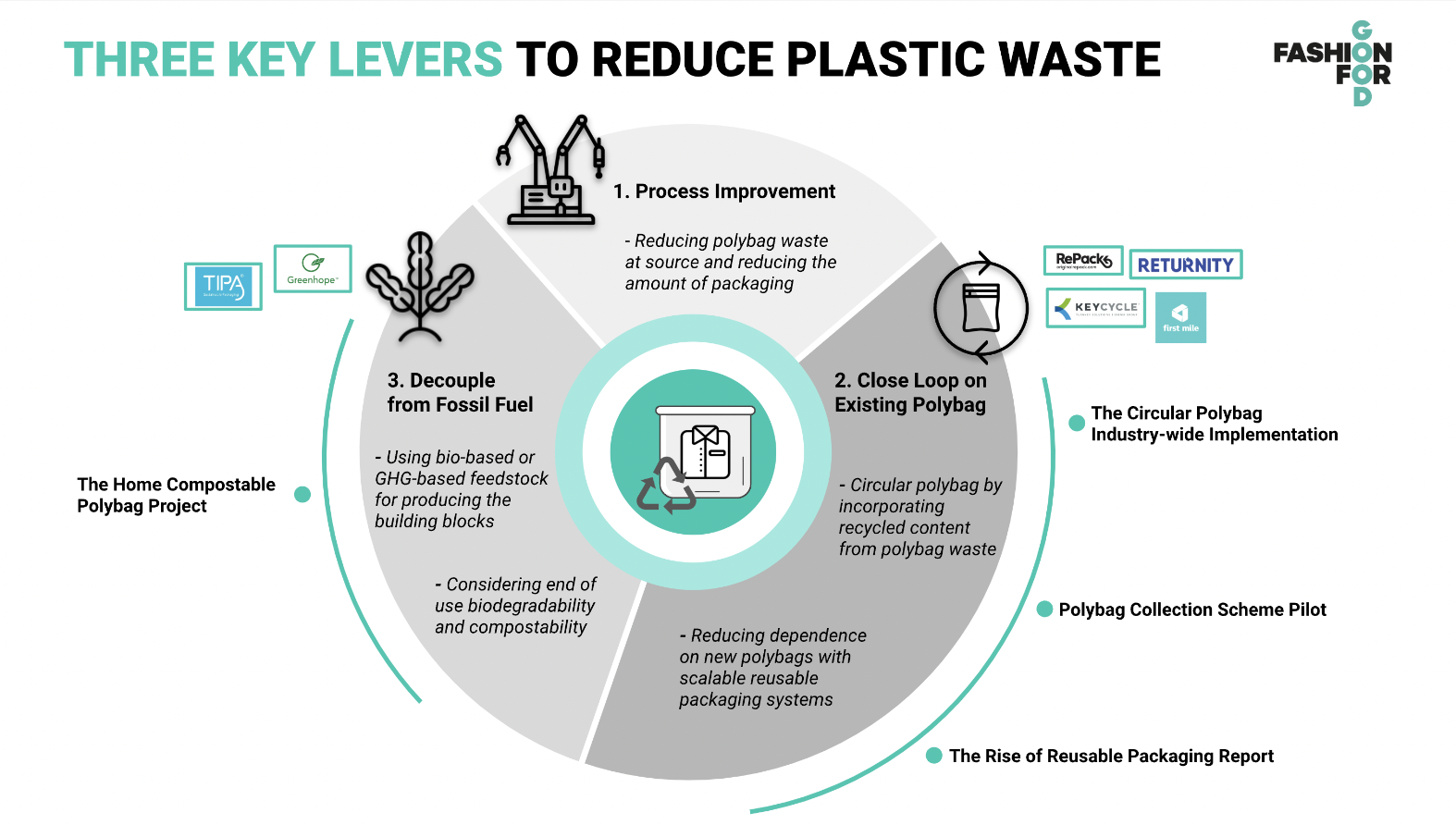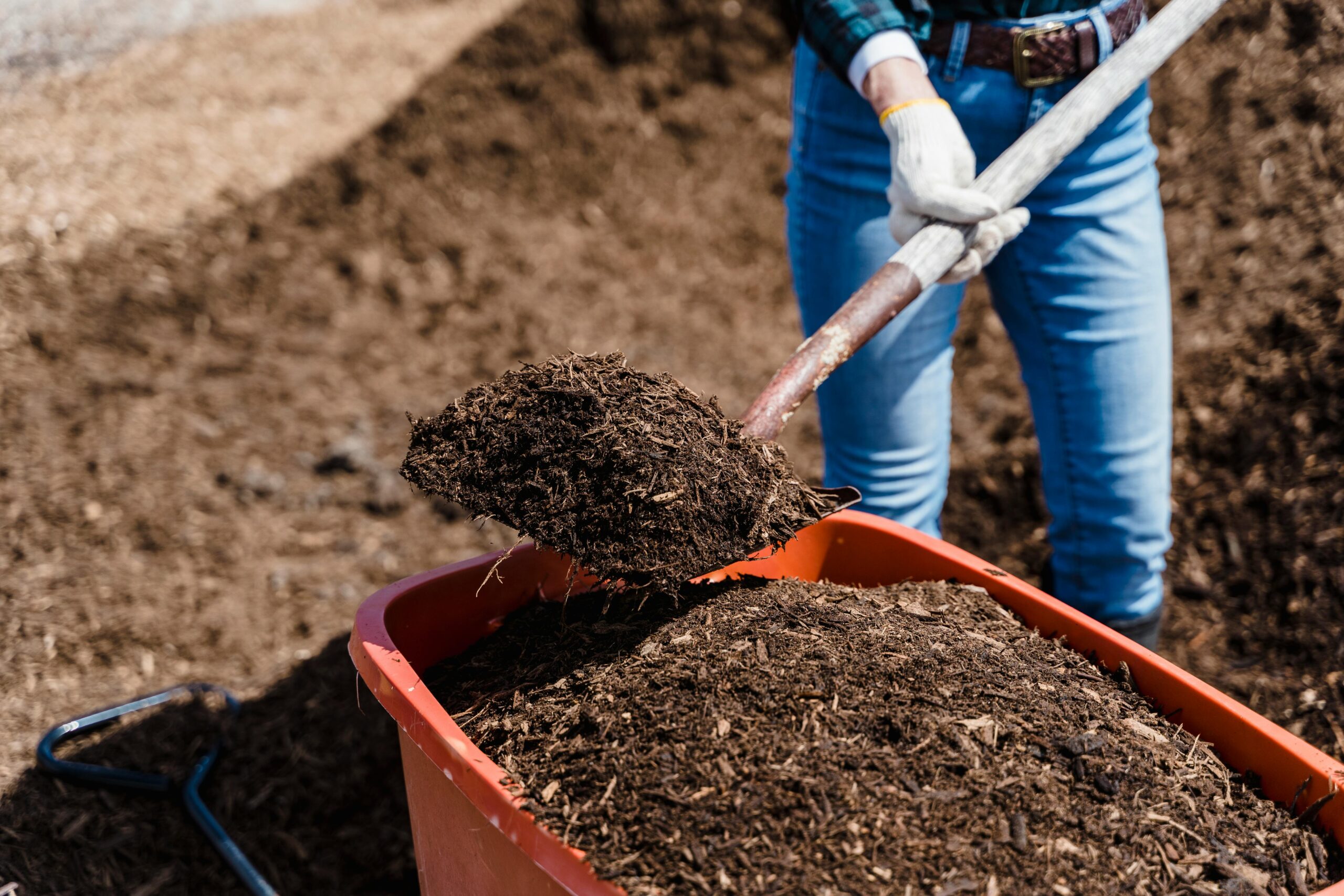
The London Polybag Collection Scheme Pilot
The London Polybag Collection Scheme Pilot aimed to address the low recycling rates of polybags used in the fashion industry by trialling a scalable recycling infrastructure for collecting and processing polybag waste into new materials.
Problem Statement
Each year, around 180 billion polybags are produced for the fashion industry, yet less than 15% are recycled due to a lack of infrastructure for collection and sorting. This results in significant environmental waste. With appropriate infrastructure, polybags could be recycled into high-quality materials, closing the loop on polybag waste.
Executive Summary
Fashion for Good, in partnership with adidas, Kering (Saint Laurent and Balenciaga), Stella McCartney, and waste collector First Mile, launched the London Polybag Collection Scheme in February 2020. The pilot focused on creating a system for collecting polybag waste from retail stores, and recycling it into new plastic sacks. The pilot demonstrated that recycling polybags is both feasible and cost-effective, reducing waste management costs for brands while creating a circular system.
Goals of the Project
-
Create a scalable system for collecting and recycling polybags.
-
Reduce contamination of polybag waste, ensuring high-quality recycling.
-
Demonstrate cost savings for brands through dedicated polybag waste streams.
-
Build awareness and educate staff on polybag recycling.
-
Project Results
-
Cost Neutrality: Brands either saved or remained cost-neutral by separating polybag waste, reducing waste collection costs by up to 40%.
-
Increased Recycling: Up to 5 tonnes of polybag waste were collected and fully recycled, creating a circular waste stream.
-
Iterative Development: Multiple polybag prototypes were iterated and tested, revealing the need for ongoing refinements to align with industry standards and scaling opportunities.
-
High-Quality Waste Stream: The separated polybag waste maintained high quality and low contamination, ensuring 100% recyclability.
-
Scalability: The pilot confirmed that a polybag collection scheme could be easily scaled with proper infrastructure and staff engagement.
Innovation Partner
Project Partners
Relevant Resources

Unpacking the Packaging Problem: Solutions and Strategies

Fashion for Good Expands Polybag Recycling Work
Global sustainability initiative Fashion For Good (FFG) has partnered with UK recycler First Mile to streamline plastic polybag recycling efforts in London, as it expands the outlook of its Plastics Packaging Project.

Podcast: Are Polybags Still in Fashion?
Ashley Holding, innovation manager at Fashion for Good and Adam Gendell, associate director of GreenBlue’s flagship project, the Sustainable Packaging Coalition, discuss findings from their joint whitepaper.

Fashion for Good Launches a Pilot to Produce a Circular Polybag

Fashion for Good Launches the Home-Compostable Polybag Project

The Home Compostable Polybag Project

Fashion for Good launches pilot to make circular polybag
Fashion for Good in partnership with Adidas, C&A, Kering, Otto Group, PVH Corp, and Cadel Deinking, has launched a new pilot project—The Circular Polybag Pilot, which will explore a solution to reduce use and impact of virgin polybags in fashion industry. The pilot is a first in apparel industry to trial a truly circular solution for polybags.

Fashion for Good launches the home-compostable polybag project
Fashion for Good launches the Home-Compostable Polybag Project, a pilot to test alternatives to conventional single-use polybags,

Pilot Project to Tackle Plastic Polybag Waste in Fashion Industry
Recycling company First Mile has partnered with global sustainable fashion innovation platform Fashion for Good on a new pilot scheme that aims to tackle the issue of plastic polybag waste in the fashion industry.
Other Projects

The Next Stride: Bio-based Materials for Footwear Soles
“The Next Stride: Bio-based Materials for Footwear Soles” aims to validate the performance and environmental impact of bio-based polymers as sustainable alternatives to the fossil fuel-derived materials currently used in footwear soles. The objective is to collectively de-risk the transition to these “next-generation” materials by rigorously testing their technical properties and assessing environmental benefits. Ultimately, the purpose is to accelerate the adoption of these bio-based solutions and pave the way for a more sustainable footwear industry.

Beyond50 Denim: Combining Cottonised Hemp And Green Chemistry
“Beyond50 Denim: Combining Cottonised Hemp And Green Chemistry” aims to validate the performance and environmental impact of cottonised hemp processed with green chemistry to act as a true alternative to cotton in denim applications. The project goal is to evaluate the performance of SEFF’s cottonised hemp fibre in combination with Fibre52’s bio-friendly chemistry solution within denim fabric applications with a total hemp content of 50% and above. The fabrics will be benchmarked against conventional 100% cotton denim with a specific focus on handfeel and aesthetic characteristics.

Price Parity Toolkit
The Price Parity Toolkit (PPT) was designed to help bridge the price gap between next-gen* and conventional materials. Developed by Fashion for Good with the support of Canopy, this industry-supported framework introduces a financing mechanism that decouples price premiums at early stages of the supply chain to enable adoption and drive the scale of lower-impact materials.




